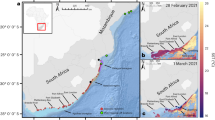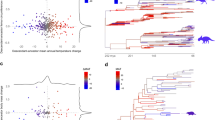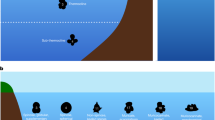Abstract
THE feeding habits of emperor penguins (Aptenodytes forsteri Gray) have been described by previous authors1–5. Most agree that the birds have access to the sea through tide cracks. During the winter of 1957 in Antarctica, I was able to observe this phase of the birds' activities and can now amplify previous comments.
This is a preview of subscription content, access via your institution
Access options
Subscribe to this journal
Receive 51 print issues and online access
$199.00 per year
only $3.90 per issue
Buy this article
- Purchase on Springer Link
- Instant access to full article PDF
Prices may be subject to local taxes which are calculated during checkout
Similar content being viewed by others
References
Wilson, E. A., Nat. Antarctic Exped. 1901–04, Nat. Hist., 2 (2), 14 (1907).
Sapin-Jaloustre, J., Oiseau, 22 (3), 143 (1952).
Cendron, J., Terre et Vie, 2, 101 (1952).
Prevost, J., Alauda, 21 (3), 141 (1953).
Stonehouse, B., Falkland Islands Dependencies Survey Sci. Rep. No. 6, 26 (1953).
Author information
Authors and Affiliations
Rights and permissions
About this article
Cite this article
WILLING, R. Feeding Habits of Emperor Penguins. Nature 182, 194–195 (1958). https://doi.org/10.1038/182194b0
Issue Date:
DOI: https://doi.org/10.1038/182194b0
This article is cited by
Comments
By submitting a comment you agree to abide by our Terms and Community Guidelines. If you find something abusive or that does not comply with our terms or guidelines please flag it as inappropriate.



